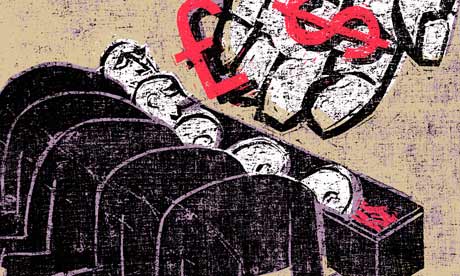I once called Richard Branson a carpetbagger. A new report reveals that I was correct to say he built his business empire with millions from the taxpayers – only it's worse than I thought

Richard Branson: 'subsidy junkie'. Photograph: Sipa USA/Rex Features
Just over 18 months ago on this page, I called Richard Branson a carpetbagger. Surveying his greatest business hits, from trains to planes to cable, my piece noted a common method: the Virgin boss liked to move into industries sheltered from too much competition, pull subsidies out of taxpayers and then cash out.
That was the story of Virgin Rail (now 49% owned by Stagecoach); of Virgin Atlantic (where the same role is played by Singapore Airlines) and it certainly fits Virgin's takeover last year of Northern Rock, where Branson was really the frontman for the serious money from America and Abu Dhabi.
Sir Richard was not best pleased. Faster than you could say "stroppy tycoon on the phone", a response in his name appeared in the Guardian, accusing me of a "vicious" attack full of "vitriol". But admirable hand-waving aside, he did not rebut my argument: that for all of his talk of enterprise and getting employees "really motivated and steamed up", Branson has built his business empire with millions from you, me and other taxpayers.
Well, last Friday a report was published that, I'm sorry to say, proves me wrong. He's an even bigger subsidy junkie than I thought.
Produced by academics at Manchester University's Centre for Research on Socio-Cultural Change (Cresc), and published by the TUC, the study looks at how Britain's railways have fared over two decades of privatisation. It's a hefty publication – more than eight months in the making, running to 166 pages and with more detail on the rail network than any commuter will ever need.
But it boils down to one key finding: the only way Branson and the vast majority of train barons make their profits is through handouts from the taxpayer. And while you may know about the direct payments taken by Virgin and others, the Cresc team has also analysed another, indirect transfer from the public purse to private hands. By now, it's worth £30bn – yet it is barely acknowledged either by Network Rail or Westminster.
Let's deal with the open-air subsidies first. If you tot up all the direct subsidies Branson's west coast mainline service received between 1997 and 2012, and convert them to today's prices, you get a sum of £2.79bn handed over by us – before a single ticket has been sold. And it is certainly before you factor in the service's upgrade (worth around £9bn, and paid for by the public), and the fleet of Pendolino trains (again, largely subsidised by the government).
By 2012, Virgin Trains enjoyed spanking new rolling stock, a more frequent service and a superfast line that whisked passengers from London to Manchester in just two hours. With all that going for it, plus a booming economy up till 2007 and rising fuel prices, the company couldn't help but pull in the customers.
Most of the improvements were subbed by taxpayers, with Virgin paying the state an agreed amount in the last two years of the franchise. Yet Branson and his shareholders could declare a cumulative net profit of £538m and trouser £499m in total dividends. No wonder some canny infants like to play with train sets.
These sums are what got Virgin interested in rail in the first place. In his biography of Branson, Tom Bower records a phrase used by the billionaire's lieutenants while weighing up the west coast deal: "It's a licence to print money. Can't go wrong."
But there is another undisclosed source of cash enjoyed by Virgin and the rest of the industry. Network Rail has been cutting the track access charges levied on the train companies. Under its predecessor Railtrack, the fees were worth around £3bn a year; they're now nearly half that, at just over £1.5bn a year. This is an indirect subsidy given by the public to the train operators, and Virgin is the third-biggest recipient. So important is the handout that, were it taken away, Cresc estimates the company would have made a loss of up to £257m last year alone.
Just so there's no doubt on the numbers, the Cresc report was shown to the Association of Train Operating Companies weeks before it was published. The trade body had time to dismantle the maths; but while it evidently doesn't like the conclusions, it hasn't repudiated the figures. Years of indirect subsidies have left Network Rail £30bn in the red. This is debt guaranteed by the public, although very few people know about it.
What all this resembles is a looking-glass version of capitalism. The public are handing money to private businesses for them to take a clip and pay us back the rest. Just in case that wasn't ludicrous enough, remember that Virgin's parent company is listed in British Virgin Islands, a sunny tax haven that is a stop pretty far from Wigan. And as we've seen repeatedly with the east coast line, the ones who don't make a profit can simply walk away, dumping their service back in public hands. Heads they win, tails you lose.
Branson is not the sole offender here; he's simply the most flamboyant representative of a completely rotten system for siphoning money from the public into private hands. The entire industry, as Treasury adviser Shriti Vadera put it in 2001, is peopled by "thinly capitalised … profiteers of the worst kind". And as a former investment banker, she'd know what those looked like.
But the Virgin boss also loves to shout about the virtues of private ownership of public good. At the moment, he's lobbying hard to take control of the east coast mainline. If successful, he'll doubtless try to replicate his previous sweet deal, state-subsidised Pendolinos and all. And just like now, it will be us paying for it.


